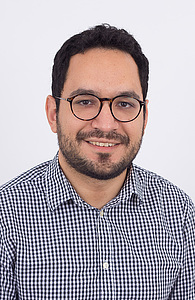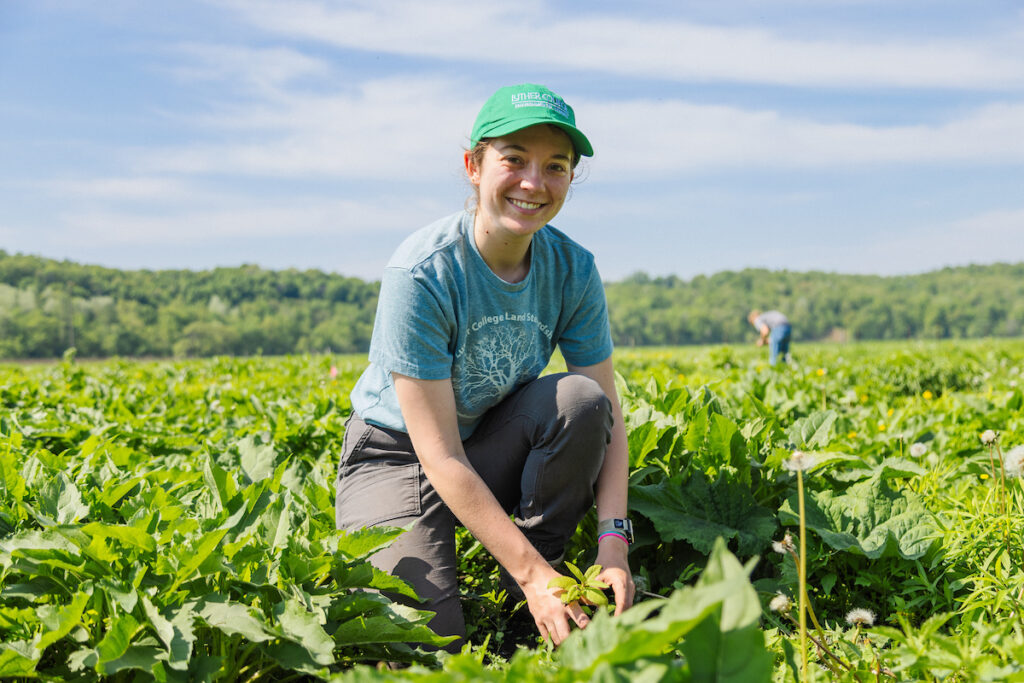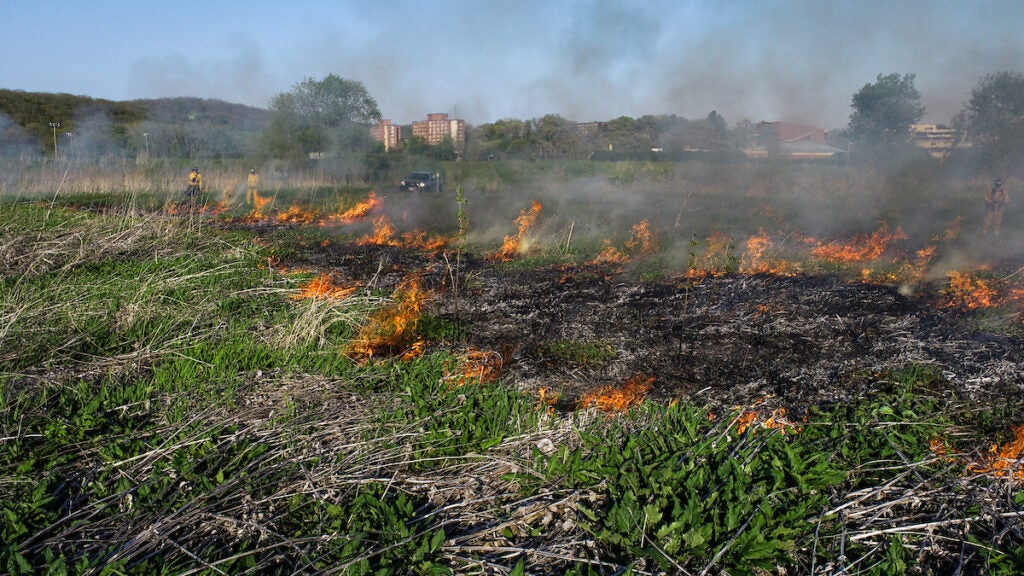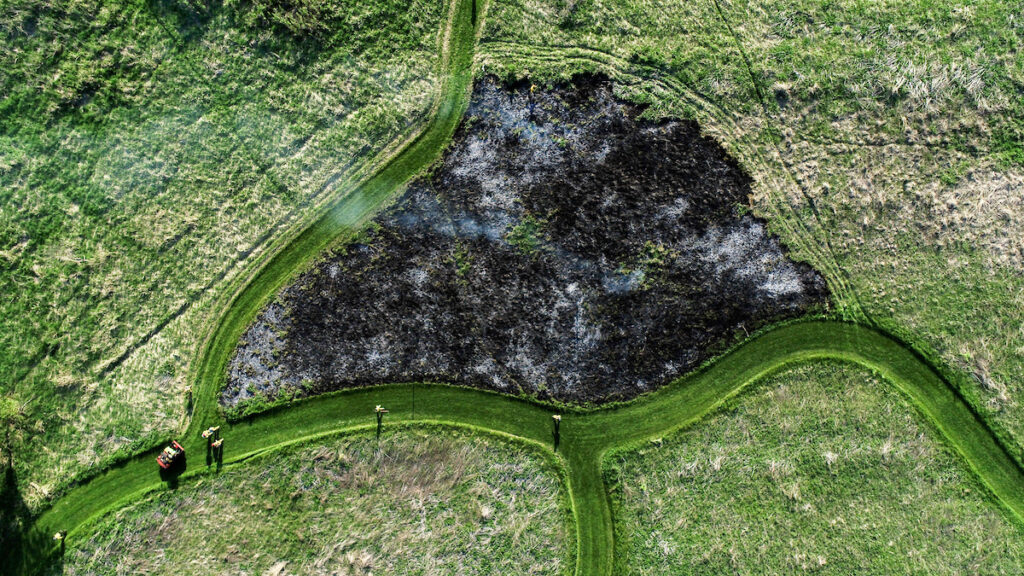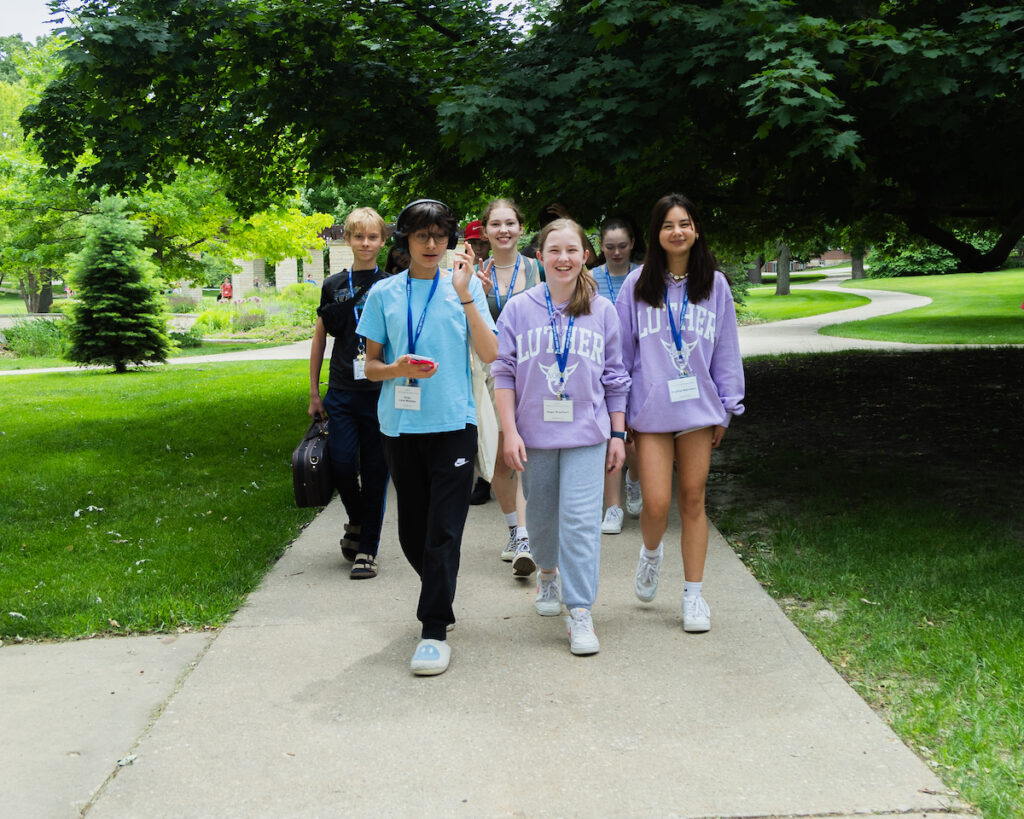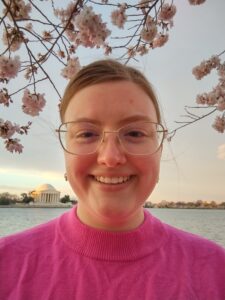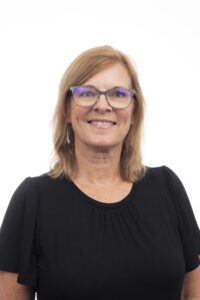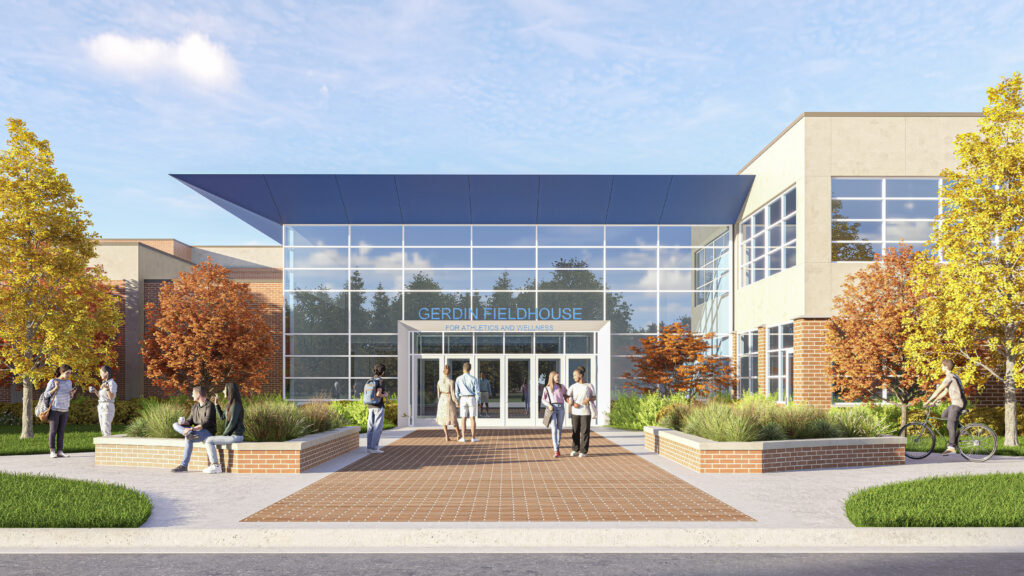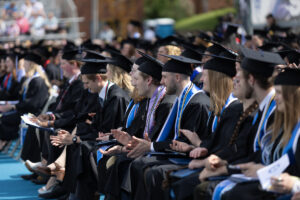
Luther College announced that 259 students graduated in May.
DECORAH, IOWA—Luther College announces that 259 students have graduated in the spring of 2024. They were honored at the 2024 Commencement Ceremony on May 19.
At the ceremony, Matilda Koeller was awarded the Luther College Elizabeth A. and Paul G. Jenson Medal. That award is presented each year to an outstanding senior, selected by the graduating class, who best demonstrates the ideals of the college through service to students and the college community.
Mallory Heinzeroth, class of 2012, received the Luther College Young Alumni Award. The award recognizes the outstanding achievement of Luther alumni who have graduated in the last 15 years.
Of the graduating class, 143 received Latin honors across a variety of majors. Watch a video featuring highlights from Commencement.
Congratulations to the following graduates:
Jane Skreien Addams, Rockford, Illinois
Nordic Studies, summa cum laude
Emma Amundson, Hastings, Minnesota
Nursing
Eva Anderson, Ames, Iowa
Nursing, magna cum laude
Blake Anderson, Oregon, Wisconsin
Biology, magna cum laude
Charlie Anderson, Woodbury, Minnesota
Accounting, Management, magna cum laude
Anghy Aragón Alegría, Jinotepe, Nicaragua
International Studies, Anthropology, Political Science, cum laude
Aliyah Arkley, Minneapolis, Minnesota
Nursing
Anya Marit Bacon, Hayward, Wisconsin
Social Work, summa cum laude
Nora Josephine Baer, Lake City, Minnesota
Nursing, cum laude
Wolfgang Baldus, Charles City, Iowa
Computer Science
Cole Thomas Barrett, Waukee, Iowa
Environmental Studies, Nordic Studies, magna cum laude
Anna Margaret Beaverson, Maple Grove, Minnesota
Nordic Studies, Psychology, magna cum laude
Kaitlyn Bebensee, West Des Moines, Iowa
Biology, cum laude
Madison Becthold, Des Moines, Iowa
Music Education, cum laude
Nathan Behrens, Falcon Heights, Minnesota
Psychology, summa cum laude
Matthew Bell, Rosemount, Minnesota
Political Science
Shayla Betts, Decorah, Iowa
Global Health
Sophie Bierlein, Eagan, Minnesota
Spanish, Political Science, International Studies, magna cum laude
Jaden Lee Bilal, Gastonia, North Carolina
Exercise Science
Jens Bjorge, Amery, Wisconsin
Biology, Nordic Studies, magna cum laude
Kaitlyn Blackburn, Stacy, Minnesota
Music Education, magna cum laude
Patrick Michael Bockman, Decorah, Iowa
Psychology, cum laude
Janet Faith Borchardt, Clarksville, Iowa
Biology, Environmental Studies, magna cum laude
Danika Brasic, Bangor, Wisconsin
English, Neuroscience
Benjamin Bridges, Portland, Oregon
Nursing, cum laude
Victoria Annalise Brown, Denver, Colorado
Nursing, cum laude
Owen Bruening, Decorah, Iowa
Biology
Channing Cade, Northfield, Minnesota
Elementary Education
Tallulah Campbell, Seattle, Washington
International Studies, Political Science, Nordic Studies, cum laude
Matthew Isaiah Canada, Tempe, Arizona
Management
Emmy Carlson, Byron, Minnesota
Nordic Studies, Exercise Science – Allied Health, magna cum laude
Javiera Caro Carrasco, Santiago, Chile
Music, magna cum laude
Gabriela Castelán, Mason City, Iowa
Economics, Management, Spanish, cum laude
Shayla Cauldwell, De Pere, Wisconsin
Communication Studies, cum laude
Cristian Chavez Paz, Liberty Township, Ohio
Social Work
Lilian Chen, Austin, Texas
Psychology, cum laude
Maxwell Chin, Waterloo, Iowa
Chemistry, magna cum laude
Brylee Christopher, Muscatine, Iowa
Elementary Education
Kimberly Rose Church, Sister Bay, Wisconsin
Nursing
Francis Cichock, Rockford, Illinois
Music, magna cum laude
Sloan Clemens, Chatfield, Minnesota
Identity Studies, magna cum laude
Gwenyth Coleman, Waverly, Iowa
Biology
Beau Hillis Cornwell, Iowa City, Iowa
Exercise Science
Morgan Coy, Mantorville, Minnesota
Music Education
Ryan David Cripe, Lakeville, Minnesota
Accounting
Ricardo Crisanto, St. Paul, Minnesota
Exercise Science
Luis Cruces Padilla, Lake Elsinore, California
Political Science
Emmelyn Cullen, Madison, Wisconsin
Biology, Theatre, summa cum laude
Jessica Dahl, Maple Grove, Minnesota
Accounting, magna cum laude
Newelle Dalton, Urbana, Iowa
Elementary Education, magna cum laude
Grace Elaine Davidson, Birmingham, Iowa
Accounting, Data Science, magna cum laude
Randall Scott Days, Colorado Springs, Colorado
Exercise Science – Strength and Conditioning
Sara De La Rosa, Mount Vernon, Iowa
Social Work, magna cum laude
Jocelyn Demiglio, Zion, Illinois
Global Health, Chemistry
Jessica Mary Droessler, Dubuque, Iowa
Biology, magna cum laude
Leo Duffy, Rockford, Minnesota
Classics
Nolan Dungey, New Hampton, Iowa
Political Science
Siobhán Dunn, Rock Island, Illinois
Music, magna cum laude
Gretchen Dwyer, Le Sueur, Minnesota
Law & Values
Sarah Edgington, Edina, Minnesota
Political Science, Philosophy
Austin Efflandt, Decorah, Iowa
Physics, Music
Jasmine Diane Elliott, Evansville, Wisconsin
Identity Studies, cum laude
Samuel Eng, Sioux Falls, South Dakota
Elementary Education
Ethan Erickson, Rochester, Minnesota
Nursing, magna cum laude
Kaeden Fellingham, Olathe, Kansas
Environmental Studies
Connor Fletcher, Plymouth, Minnesota
Psychology
Reece Flynn, Mantorville, Minnesota
Computer Science
Megan Frutiger, Mankato, Minnesota
Nursing
Britt Ahlers Fulton, Minneapolis, Minnesota
Global Health, magna cum laude
Miguel Garcia, Glendale Heights, Illinois
Economics
Fiona Garrity, Batavia, Illinois
Nursing, magna cum laude
Betsy Gebhard, Minneapolis, Minnesota
Anthropology, cum laude
Benjamin Gill, Sydney, Australia
Economics, Law & Values, magna cum laude
Griffin Finster Glassel, Madison, Wisconsin
Chemistry, summa cum laude
Gabriel V. Goeddeke, Minneapolis, Minnesota
Music, Environmental Studies
Ana Goellner, Mankato, Minnesota
Biology, magna cum laude
Ian Patrick Gonzales, Olathe, Kansas
Anthropology, Nordic Studies, summa cum laude
Delilah Gray, Des Moines, Iowa
Elementary Education, summa cum laude
Ingrid Gustafson, Apple Valley, Minnesota
Environmental Studies, Nordic Studies
Makayla Haddorff, Eagan, Minnesota
Spanish, Exercise Science –Allied Health, summa cum laude
Thomas Hadley, Decorah, Iowa
Communication Studies, cum laude
Maggie Haller, Minneapolis, Minnesota
Biology, Classics, Global Health, summa cum laude
Kjerstin Halverson, Woodbury, Minnesota
Psychology, summa cum laude
Abigail Mckenzie Hamborg, Bettendorf, Iowa
Accounting, summa cum laude
Kai Haroldson, Excelsior, Minnesota
Psychology
Kerrigan Leslie Hatch, Gladbrook, Iowa
Nursing
Beau Hawley-Bourcier, Decorah, Iowa
Visual Communication
Willem Hawley-Bourcier, Decorah, Iowa
Communication Studies
Rikka Heimdal, Milford, Iowa
Chemistry
Rachel Heinrich, Menomonie, Wisconsin
Biology, Art, magna cum laude
Elizabeth Hemmingson, Rochester, Minnesota
Social Work
Blake William Henriquez, Decorah, Iowa
Accounting
Peter Heryla, Fridley, Minnesota
Communication Studies, magna cum laude
Samantha Lelani Himegarner, Waunakee, Wisconsin
Music, magna cum laude
Leigh Hjelmseth, Bellingham, Washington
Elementary Education, summa cum laude
Nancy Le, Hue, Vietnam
Visual Communication, summa cum laude
Ethan Holbert, Andalusia, Illinois
Political Science
Ava Holland, Decorah, Iowa
Health Promotion, summa cum laude
Aydan Holub-Schultz, Mount Vernon, Iowa
Exercise Science
Dylan Holven, Faribault, Minnesota
Environmental Studies
Noah Howe, Minnetonka, Minnesota
Psychology, magna cum laude
Cassandra Hultgren, Chandler, Arizona
Communication Studies, French, summa cum laude
Anna Hunke, Crystal, Minnesota
Accounting, Management, summa cum laude
Aidan Hunter, Decorah, Iowa
Management
Ayden Jay Kaniteli Hursky, Yuba City, California
Management
Mia Irving, Coralville, Iowa
English, cum laude
Gabrielle Joy Janssen, Emmetsburg, Iowa
Religion, Sociology, summa cum laude
Linnea Johnson Nordqvist, Gothenburg, Sweden
Global Health, summa cum laude
Joshua Michael Kainz, Saint Michael, Minnesota
Music Education, magna cum laude
Thomas Kaktis, Emmons, Minnesota
Management
Avihe Mwaithapotji Kalipondoka, Opuwo, Namibia
Biology, Data Science
Jackson Kates, Dubuque, Iowa
English, cum laude
Grant Keim, Littleton, Colorado
Sociology
Malina Kirtley, Woodland Park, Colorado
Nursing
Anna Louise Kjeldahl, Maple Grove, Minnesota
Nursing, magna cum laude
Cirdan Klindworth, Roseville, Minnesota
Physics, summa cum laude
Ethan Kober, Cedar Falls, Iowa
English, Religion, summa cum laude
Matilda Koeller, McGregor, Iowa
Identity Studies
Adam Koller, Worthington, Minnesota
Data Science, Mathematics, summa cum laude
Stian Mesna Krogstad, Fargo, North Dakota
Environmental Studies
Isaac Kubat, Paynesville, Minnesota
Religion
Marshall Laidlaw, Red Wing, Minnesota
Religion, German, Identity Studies, summa cum laude
Caroline Lambrecht, Rosemount, Minnesota
Social Work
Ruby Langholz, Decorah, Iowa
Visual Communication
Jacob Larson, Waconia, Minnesota
Physics, cum laude
Thane Larson, Franktown, Colorado
Physics
Grace Lawrence, Osseo, Wisconsin
Social Work
Andrew Lazinbat, San Antonio, Texas
Exercise Science – Strength and Conditioning
Mckinley Leinweber, Union Grove, Wisconsin
English, cum laude
Dickyi Lhamo, Amdo, Tibet
Neuroscience
Brooke Lidberg, Hastings, Minnesota
Nursing
Peyton Christian Lindmark, Bettendorf, Iowa
Exercise Science
Chilekwa Ling’omba, Lusaka, Zambia
Management
Madelynn Liston, Knoxville, Iowa
Nursing
Samuel Nathan Llamzon, Singapore, Singapore
Mathematics, Music
Max Loen, Eau Claire, Wisconsin
Environmental Studies
Samuel Greggory Lubs, Cedar Falls, Iowa
Music Education
Jonathan Lundeby, Arvada, Colorado
Exercise Science
Olivia Ann Luster, Janesville, Wisconsin
Management, cum laude
Cassandra Magee, Fort Collins, Colorado
Music Education, magna cum laude
Andrew Mantini, Brooklyn Park, Minnesota
German, Visual Communication, cum laude
Eva Mark, Springfield, Minnesota
English, summa cum laude
Emily Marthaler, West Union, Minnesota
Social Work
Kirby Masso, White Bear, Minnesota
Data Science, cum laude
Samuel Maston, Hudson, Massachusetts
Biology, magna cum laude
Joshua Matanich, Lake City, Minnesota
Exercise Science
Hannah McCarthy, Prairie City, Iowa
History
Liliana Louise McGohan, Decorah, Iowa
Music Education, magna cum laude
Layken McGuire, Lexington, Illinois
Biology, Anthropology
Timothy Tre’ William Mewborn, Colorado Springs, Colorado
Management
Josie Meyer, Robbinsdale, Minnesota
Environmental Studies, summa cum laude
Bryson Miller, Parker, Colorado
Management
Isabelle Mooney, Arcadia, Wisconsin
History
Kyle Steven Edward Morony, Spencer, Iowa
Mathematics/Statistics
Kiara Morten, Janesville, Wisconsin
Visual Communication
Johanna Muenkel, Rochester, Minnesota
Nursing, cum laude
Margaret Abigail Mullin, Minneapolis, Minnesota
Environmental Studies, summa cum laude
Natalie Neff, Marion, Iowa
Spanish, Biology
Camryn Nelson, Maple Grove, Minnesota
Music, cum laude
Minh, Ha Tinh, Viet Nam
Mathematics, Physics, magna cum laude
Kiley Nolan, Libertyville, Illinois
Allied Health Sciences, cum laude
Cassandra Norton, Lakeville, Minnesota
International Studies, German, summa cum laude
Madelyn O’Brien, Cedar Rapids, Iowa
Biology, summa cum laude
Christopher O’Brien, Eagan, Minnesota
Management
William Ode, Des Moines, Iowa
Physics, magna cum laude
Sarah Elisabeth Olson, Waverly, Iowa
Global Health – Plan 3, cum laude
Samuel Orgon, Elk River, Minnesota
Accounting
Mary Elizabeth Osborne, Esko, Minnesota
Communication Studies, magna cum laude
Abigail Ostrum, Rosemount, Minnesota
Nursing, magna cum laude
Grace Parrott, Iowa City, Iowa
Environmental Studies, magna cum laude
Lainey Patzloff, Edina, Minnesota
Music Education, cum laude
Lewis Peters, La Crescent, Minnesota
Law & Values
Rhylan Peterson, Dodge Center, Minnesota
Theatre
Anders Peterson, Dassel, Minnesota
Music Education, summa cum laude
Samantha Peterson, Maple Grove, Minnesota
Social Work, cum laude
Daniel Pfeffer-Kleemann, Rochester, Minnesota
Chemistry, summa cum laude
Cody Pierce, Mineral Point, Wisconsin
Computer Science, summa cum laude
Claudia Podesta, Blaine, Minnesota
Nursing, summa cum laude
Luke Prendergast, Denver, Iowa
Management
Emma Prostine, Cedar Rapids, Iowa
Chemistry, summa cum laude
McKenna Jillane Prunty, Worthington, Minnesota
Biology
Erik Radke, Duluth, Minnesota
Mathematics, Data Science, summa cum laude
Charlotte Ravenscroft, Madison, Wisconsin
Nursing, magna cum laude
Samantha Reesman, Burlington, Wisconsin
Nursing
Malachi Rettmann, Madison, Wisconsin
Music, Management, summa cum laude
Mason Reuter, Monticello, Iowa
Visual Communication
Nicholas Rogness, Roseville, Minnesota
Data Science, Nordic Studies, Mathematics, summa cum laude
Mason Ross, Queen Creek, Arizona
Management, Political Science
Jordan Marie Rubie, Winona, Minnesota
Allied Health Sciences
Scott Rust, Hudson, Wisconsin
English, cum laude
Samantha Sabin, Inver Grove Heights, Minnesota
Communication Studies, summa cum laude
Sofía del Carmen Sackett, Des Moines, Iowa
Biology, Spanish, cum laude
Braydon Saltou, Decorah, Iowa
Neuroscience, summa cum laude
Marina Elisabeth Sawyer, Saint Peter, Minnesota
Environmental Studies, cum laude
Gabriella Ann Schei, Stewartville, Minnesota
Biology
Skyler Schneider, Wellman, Iowa
Elementary Education, magna cum laude
Preston Schuelke, Rockford, Illinois
History
Alena Schuemann, Loveland, Colorado
Music Education, cum laude
Samuel Scott, Banning, California
Management
Sophie Selenke, Hudson, Iowa
Nursing, cum laude
Margaret Sessions, Decorah, Iowa
Global Health, Social Work, magna cum laude
Eric Shaffer, Coralville, Iowa
Chemistry, magna cum laude
Ren Shedinger, Decorah, Iowa
Visual Communication, cum laude
Ava Anthea Shively, La Crosse, Wisconsin
Art, German, magna cum laude
Ellie Shuros, Saint Paul, Minnesota
Biology, magna cum laude
Lauren Nicole Siems, North Liberty, Iowa
Theatre, magna cum laude
Abigail Slininger, Inver Grove Heights, Minnesota
Allied Health Sciences, Exercise Science, cum laude
Lillian Smith, Decorah, Iowa
Classics, magna cum laude
Natalia Smith, Littleton, Colorado
Psychology
Matthew Snavely, Grayslake, Illinois
Mathematics
Mattie Snyder, Bemidji, Minnesota
Music, Visual Communication, magna cum laude
Amelia Daisy Solum, Spring Grove, Minnesota
Nursing, magna cum laude
Kaj Spencerberg, Decorah, Iowa
Theatre
Abby Johanna Spore, Robins, Iowa
Biology, cum laude
Cullen Stamp, Plymouth, Minnesota
Allied Health Sciences, Exercise Science, magna cum laude
Jacob Steenhoek, Ames, Iowa
Management
Blake Storby, Lake Mills, Iowa
Exercise Science
Margaret Stucker, Roseville, Minnesota
Biology
Mia Suzuki, Rochester, Minnesota
International Studies, summa cum laude
Alexis Svestka, Decorah, Iowa
Nursing
Katherine Syers, St. Paul, Minnesota
Nursing
Tan Hung Kai, Singapore, Singapore
Music
Carly Tautges, Rochester, Minnesota
Nursing, cum laude
Melissa Tholen, St. Paul, Minnesota
History
Malachi Thompson, Johnston, Iowa
Data Science
Sasha Tomasevich, Oakdale, Minnesota
Music
Truong Dang Duong, Vung Tau, Vietnam
Nursing, magna cum laude
Lucy Tschida, Minneapolis, Minnesota
Environmental Studies, cum laude
Phat Tu, Ho Chi Minh City, Vietnam
Computer Science
Kaylee Turney, Zimmerman, Minnesota
Music Education, magna cum laude
William Oxendine Valentine, Los Angeles, California
Political Science
Eleanor Jean Van Fleet, Alexis, Illinois
English
Julia Veit, Iowa City, Iowa
Chemistry
Chayla Louise Velander, Lakeville, Minnesota
Nursing, summa cum laude
Samuel Vue, Lakeville, Minnesota
Computer Science, cum laude
Vuong Tran Luc, Nghe An, Vietnam
Computer Science, cum laude
Caleb Wake, Wellington, New Zealand
Art
Madeleine Way, Sun Prairie, Wisconsin
Political Science, cum laude
Amy Webb, Waverly, Iowa
International Studies, German, summa cum laude
Michaela Weber, Lakeville, Minnesota
Accounting, Management, cum laude
Daniel Webster, Dallas, Texas
Management
Ted Weigle, St. Michael, Minnesota
History, magna cum laude
Lara Elizabeth Welter, Eden Prairie, Minnesota
Mathematics
Keaton M. Wenz, Mount Vernon, Iowa
Philosophy, Political Science, German, summa cum laude
Austin Wesenberg, Cold Spring, Minnesota
Environmental Studies, summa cum laude
Nia Whitsitt, Decorah, Iowa
Identity Studies
Dylan Wiemers, Coal Valley, Illinois
Management
Elise Wilson, Ankeny, Iowa
Environmental Studies, magna cum laude
Rory Wisgerhof, White Bear Lake, Minnesota
Biology
Nate Withers, Ames, Iowa
Management
Dre’ Withers, Rochester, Minnesota
Social Work
Carly Witucki, Menomonie, Wisconsin
Music Education, summa cum laude
Linnea Birgitte Wolle, Arvada, Colorado
Mathematics/Statistics, cum laude
Maya Wosepka, St. Paul, Minnesota
Accounting, cum laude
Zella Wynsma, Davenport, Iowa
Mathematics, magna cum laude
Hermminat Yusuff, Walden, New York
Psychology
Abigail Susan Zeeh, McGregor, Iowa
Psychology
Samuel Zegler-Evans, Topock, Arizona
Nursing, cum laude
Quinn Zeleny, West Saint Paul, Minnesota
Elementary Education

